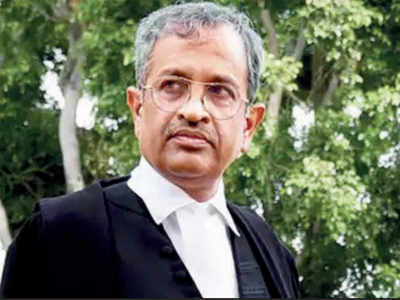
MANGALURU: Karnataka's coast is famous not only for its entrepreneurship spirit, but also for legal minds who have left an indelible mark - be it Kawdoor Sadananda Hegde, his son Nitte Santosh Hegde, S Abdul Nazeer, John Michael D'Cunha and MF Saldanha, to name a few.
Now, the focus is on senior advocate Sanjay Hegde, 54, with the apex court asking him to be the interlocutor with protesters at Shaheen Bagh, Delhi, and persuade them to shift out.
Hegde was born in Manipal and did his class 1 there. He continued his studies in Mumbai as his father was a lawyer there. After class 10, he spent five years in Manipal and moved to Mumbai to pursue law at KC Law College, Mumbai after his BCom. "We had purchased a house at Doddanagudde, Manipal. My father sent me to do my under-graduation and graduation there. My mother was an English lecturer at KREC (now NIT-K Surathkal),'' he told TOI.
Though Hegde got selected by UPSC for a non-IAS service, after doing LL.M, he started out in the Supreme Court with then attorney general G Ramaswamy, who he acknowledges as his guru.
During this period, he worked on several high-profile cases, appeared for the government of India before an international arbitral tribunal and from 1996 to 2004 was on the Union of India's arguing panel before the Supreme Court. He also worked for a decade as the Advocate on Record for Karnataka and thereafter focused on private practice. He was then designated a senior advocate by the Supreme Court in 2015 and since then, he has appeared in several matters, including the Nirbhaya case where he was asked by the court to assist as an amicus curiae. He has frequently engaged in legal journalism, including appearances on television panels and as columnist for newspapers. He says he's "a history buff with a sense of humour & rumour. Militant secularist. Good food, good friends & good times make my day".
Now, he's a leading voice for civil rights, sometimes going against the popular grain. Hegde says he believes a democracy without a dissenter is impossible. "Free men, in the exercise of free thought, will give vent in free speech. No matter how abhorrent the thought or its manner of expression, a mature democracy will tolerate it, and even encourage its publication. It's better for an imperfect thought to be voiced, and rejected in the market place of ideas than for it to fester within the warehouses of inexpressible thought. After all, there is no greater idea of democracy than free men, freely and voluntarily, committing to the requirements of citizenship of a free country,'' he says.
Prof MD Nanjunda, guide and staff adviser at MGM College, when Hegde studied BCom, said: "He's very independent - neither a leftist nor rightist. He critically analyses everything. He was brilliant and the best quizzer in South Kanara those days. He neglected BCom as it wasn't to his taste. He was excellent in public speaking and used to win against teams from MIT and KREC."
He added, "After BCom, he came to me for advice. I told him not to opt for MCom; law would be a better option given his talent.''
Now, the focus is on senior advocate Sanjay Hegde, 54, with the apex court asking him to be the interlocutor with protesters at Shaheen Bagh, Delhi, and persuade them to shift out.
Hegde was born in Manipal and did his class 1 there. He continued his studies in Mumbai as his father was a lawyer there. After class 10, he spent five years in Manipal and moved to Mumbai to pursue law at KC Law College, Mumbai after his BCom. "We had purchased a house at Doddanagudde, Manipal. My father sent me to do my under-graduation and graduation there. My mother was an English lecturer at KREC (now NIT-K Surathkal),'' he told TOI.
Though Hegde got selected by UPSC for a non-IAS service, after doing LL.M, he started out in the Supreme Court with then attorney general G Ramaswamy, who he acknowledges as his guru.
During this period, he worked on several high-profile cases, appeared for the government of India before an international arbitral tribunal and from 1996 to 2004 was on the Union of India's arguing panel before the Supreme Court. He also worked for a decade as the Advocate on Record for Karnataka and thereafter focused on private practice. He was then designated a senior advocate by the Supreme Court in 2015 and since then, he has appeared in several matters, including the Nirbhaya case where he was asked by the court to assist as an amicus curiae. He has frequently engaged in legal journalism, including appearances on television panels and as columnist for newspapers. He says he's "a history buff with a sense of humour & rumour. Militant secularist. Good food, good friends & good times make my day".
Now, he's a leading voice for civil rights, sometimes going against the popular grain. Hegde says he believes a democracy without a dissenter is impossible. "Free men, in the exercise of free thought, will give vent in free speech. No matter how abhorrent the thought or its manner of expression, a mature democracy will tolerate it, and even encourage its publication. It's better for an imperfect thought to be voiced, and rejected in the market place of ideas than for it to fester within the warehouses of inexpressible thought. After all, there is no greater idea of democracy than free men, freely and voluntarily, committing to the requirements of citizenship of a free country,'' he says.
Prof MD Nanjunda, guide and staff adviser at MGM College, when Hegde studied BCom, said: "He's very independent - neither a leftist nor rightist. He critically analyses everything. He was brilliant and the best quizzer in South Kanara those days. He neglected BCom as it wasn't to his taste. He was excellent in public speaking and used to win against teams from MIT and KREC."
He added, "After BCom, he came to me for advice. I told him not to opt for MCom; law would be a better option given his talent.''
Trending Topics
LATEST VIDEOS
City
 Bhuj sect's Swami stirs controversy, says 'If menstruating women cook food, they will be born as bitch in next life'
Bhuj sect's Swami stirs controversy, says 'If menstruating women cook food, they will be born as bitch in next life'  30 kg gold looted in Ludhiana, robbers caught on camera
30 kg gold looted in Ludhiana, robbers caught on camera  Jamia student files case against Delhi police, seek Rs 1 crore as compensation
Jamia student files case against Delhi police, seek Rs 1 crore as compensation  Mangaluru restaurant offers complementary biryani to blood donors
Mangaluru restaurant offers complementary biryani to blood donors
More from TOI
Navbharat Times
Featured Today in Travel
Get the app



